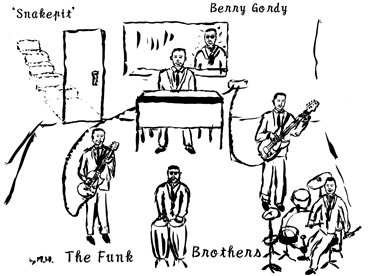

At first, the audience in Japan may generally associate ''60's western music' with Beatles, and, as a rival of them, may also raise the name of Motown, where incessant hits were brought out by persons of prominence including Supremes, Temptations, Four Tops, Smokey Robinson & Miracles, Marvelettes, Martha & Vandellas, Marvin Gaye and Stevie Wonder. Such stars' emblems shone on the one hand, their supporting performers' never appeared at that time on the other. They are commonly called as 'The Funk Brothers'. I heard of them for the first time when I read a book in a library titled "Where Did Our Love Go?", written by Nelson George and translated in Japanese by Himeji Hayashida. This book was published in1985 in the U.S. and told chiefly about the president of Motown, Berry Gordy. Because of his hard-core secrecy the author was forced to gather stories from the outside men, however, it ended with juicy fruits rather than mere publicity. It tells the interesting story of each artist mentioned above, and furthermore, it tells quite nice on the episodes of the Funk Brothers, who had never appeared in the interviews of Motown persons or the credits of the albums.
As a bebop-lover Berry Gordy got people in the jazz field together, their performances were less influenced by the blues and they played tunes in a sophisticated and tight northern style of Detroit. But their arrangements were more condensed and crammed than well-ballanced ones of corporate labels in New York, and their backings were performed modestly in contrast with brilliant and gorgeous vocals. In the mid-'60s, however, Motown cut a series of such remarkable sides as you realize at first hearing. Especially, thanks to James Jamerson, the electric bass which had once only follow the notes generally in '50s became an instrument yielding more complicated rhythms : his bass lines in Four Tops' Reach Out I'll Be There or Marvin Gaye's What's Going On still can stand listening ("The Ultimate Collection (Four Tops)", "What's Going On"). The band was constracted mainly by his bass, the drums of Benny Benjamin with strong beats and characteristic triplets in fill-ins, and the organ of the band leader Earl Van Dyke. Added with other instruments such as the guitar of Robert White or the congas of Eddie 'Bongo' Brown, they were crammed in the small basement studio 'Snakepit' and spawned the Motown sound in the mid-60s. (According to "Where Did Our Love Go?", there were some recordings also in New York or Los Angeles, and moreover, in recent years someone claims that Jamerson-playing Four Tops tunes were "played by me in reality". I don't know whether it is true or not, however, I assure you it was the Funk Brothers of Detroit who gave the directions to the unique Motown sound.)
Contrary to Stax where not only stars but the backing Booker T & the MG's had their own hits, Motown made an apparent difference between them, marketable stars or supporting producers, and musicians. I guess that was because the company wanted to keep musicians at hand in order to call them together in any time, and wanted to take charge of stars for sophisticated appearances at clubs with many white audiences and to made them keep off musicians who were easy to be drown in alcohol or drugs in their lives. In spite of it, Funk Brothers got along with stars like Stevie Wonder or Marvin Gaye who were also instrumentalists, and then they satisfied themselves with adding side jobs brought from out of Motown and doing gigs at home clubs. You can hear such performances on the original soundtrack "Standing in the Shadows of Motown(Deluxe Edition)", and you can find Jackie Wilson's (Your Love Keeps Lifting Me) Higher and Higher, John Lee Hooker's Boom Boom and so on were performed by the Funk Brothers.
For softening musicians' complaints, Motown released singles and albums under the name of 'Earl Van Dyke & The Soul Brothers' or 'Earl Van Dyke'. Their originals are The Flick on "Standing in the Shadows of Motown" and some on "The Best of The Funk Brothers", both of which also contains instrumentals of hit tunes backed by them. Over half of tunes in their name are 'karaokes' or melodies of organ were attached to some of them, and the rest originals are regrettable for their moderate compositions (The Flick and The Stingray in the early-'70s loose funk groove are OK, though). It's not bad for the Funk Brothers, who used to be underappreciated, to attract everybody's attention thanks to the movie 'Standing in the Shadows of Motown' or the release of their best album. Paradoxically this phenomenon means, it seems to me, that ultimately commercial music is lacking in such 'stirring' fatal tragedies that the brothers bore. Although they were treated worse than stars and had yearnings or envies for them, the Funk Brothers themselves might not have so worried about it. Finally they got good pay and lived their lives to their hearts' content. I think they were the best for concentrating on performing groovy backings, not self-assertive playings. What kind of music would they have made if they had played freely? I don't know but I wish I would try it. (2004/12/14)(2006/06/30)